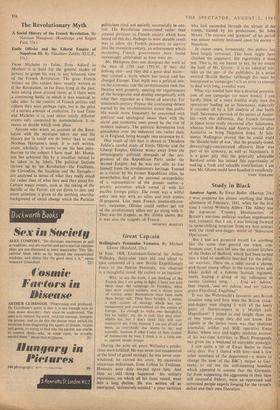The Revolutionary Myth
FROM Michelet to Taine, from Aulard to Mathiez it is hard for the general reader of history to grope his way to any balanced view of the French Revolution. The great French writers on this subject have usually written as if the Revolution, so far from lying in the past, were taking place around them; as if there were a continuing battle in which it was essential to take sides. In the context of French politics and culture they were perhaps right, but at the price of a certain amount of confusion. To read Taine and Michelet is to read about totally different events only connected by nomenclature. It re- mains to decide which took place.
Anyone who wants an account of the Revo- lution with the mystique taken out and the history put in could not do better than to read Norman Hampson's book. It is well written, acute, scholarly; it seems to me the best intro- duction to the subject I have read. Mr. Hamp- son has achieved this by a steadfast refusal to be taken in by labels. The political factions thrown up by the Revolution—the Feuillants, the Girondins, the Jacobins and the Enragds- are analysed in terms of what they really stood for rather than of what they said they stood for. Certain major events, such as the taking of the Bastille or the Terror, are cut down to size, and more attention is given to the seething anarchic background of social change which the Parisian
politicians tried not entirely successfully to con- trol. The Revolution consecrated rather than created divisions in French society which have lasted till this day. Perhaps its most durable result was to allow the French peasantry to survive into the twentieth century, an achievement which succeeding French governments have found increasingly ambivalent as time went on.
Mr. Hampson does not denigrate the work of the men of 1789 and 1792-93. If they did nothing else—and they did a great deal more— they created a myth which has lasted and has changed Europe. That myth was a political one; on the economic side the revolutionaries took few liberties with property, meeting the requirements of the bourgeoisie and dealing energetically with what they regarded as a threat of anarchy. For nineteenth-century France the continuing debate started by the revolutionaries meant that public life would more frequently be concerned with political and ideological issues than with the social and economic ones posed by the rise of modern industry. The political Revolution took precedence over the industrial one rather than, as in England, being brought into existence by it.
One result of this fact is shown in Theodore Zeldin's careful study of Emile 011ivier and the Liberal Empire. 011ivier broke away from the intransigently political demands of the pro- gramme of the Republican Party under the Second Empire, but he was not able to free himself from the revolutionary heritage. Treated as a traitor by his former Republican allies, he nevertheless had all the national susceptibility of a representative of the grande nation—a prickly patriotism which sorted ill with his pacifist foreign policy. The result was a wilful entry into war with no allies and with armies ill-prepared. Like most French nineteenth-cen- tury statesmen, 011ivier could neither get rid of the revolutionary ethos nor go along with it. That was his tragedy, as Mr. Zeldin shows. But it was also the tragedy of France.
ANTHONY HARI LEY






























 Previous page
Previous page